A Well-Deserved Honor
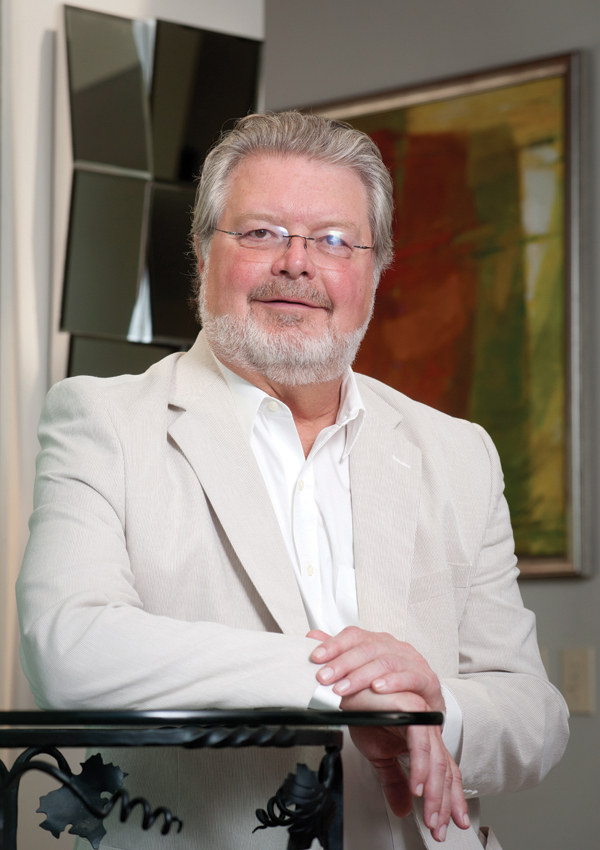
Dr. Paul Parker didn’t realize what was going on, even when his wife suggested he wear his new shirt and long pants to what he thought was a cookout with friends.
He didn’t realize, even when he arrived at the “cookout” and spotted Dr. Jimmy Keeton, University of Mississippi Medical Center vice-chancellor for health affairs or Dr. Rick Barr, chair of pediatrics and a bevy of co-workers past and present.
Being less than a month away from retiring, Parker thought it must be a retirement party. This man, who had carried UMMC’s pediatric gastroenterology program on his shoulders for the better part of 18 years, never presumed that his hard work was worth the honor that awaited him there.
It wasn’t until he saw the list of donors that he realized what was going on: An academic chair was being named in his honor.
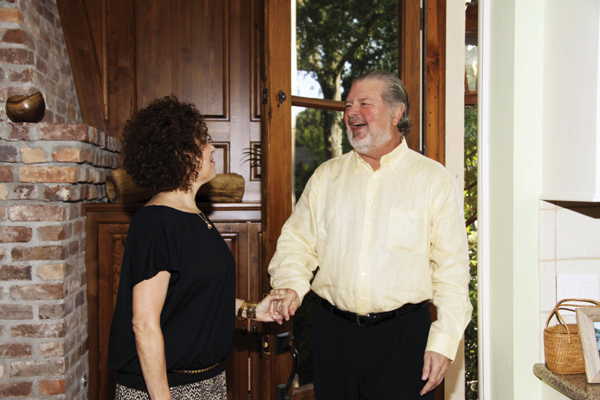
“I was in shock. I never dreamed. And when I say I never dreamed, I mean honestly, never even considered that,” said Parker, professor emeritus of pediatric gastroenterology.
“Unfortunately there just aren’t that many chairs. It wasn’t something that was even a possibility as far as I was concerned. It was pretty special.”
Indeed it is special. The Paul H. Parker Chair of Pediatric Gastroenterology, a position meant to enhance research and clinical care in pediatric gastroenterology, is only the third funded chair in the Department of Pediatrics, following the Suzan B. Thames Professor and Chair of Pediatrics and the D. Jeanette Pullen Professor and Chair of Pediatric Hematology-Oncology.
Parker, a University of Mississippi School of Medicine graduate, began the pediatric gastroenterology program in 1981 after a fellowship at Vanderbilt University in Nashville.
He was the only pediatric gastroenterologist in the state for many years.
“I had a full clinic schedule from the first day and I was on-call for 17 / years,” he said.
But when he says this, he’s not complaining. Parker is part of a generation of pediatricians who simply did what had to be done. Often that meant surrendering the better part of one’s personal life to help the state’s sick children.
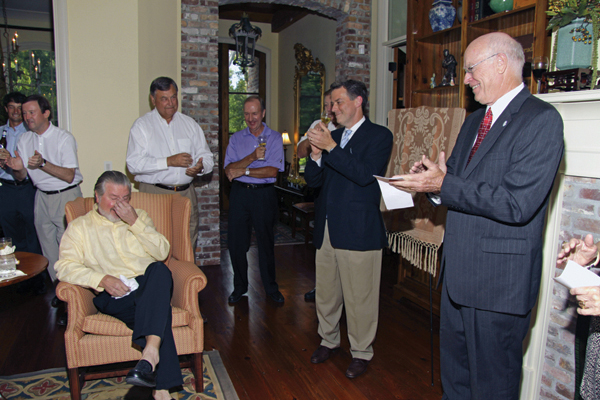
“It was never that big of an imposition,” he said. “And I think that’s true of a lot of physicians at the children’s hospital at the time and physicians everywhere. You sort of just did what you had to do. Very few people ever complained about it. Everybody else was working just as hard.”
Dr. Owen “Bev” Evans, chair emeritus of pediatrics, who arrived at the Medical Center a year after Parker, said at that time all of the subspecialty divisions had a single faculty member. The exceptions were cardiology, hematology/oncology and neonatology.
“No one felt put upon because we were all working equally,” Evans said.
Evans also noted that Dr. Blair Batson, the first chair of the department and hospital namesake, created a culture in the pediatric department with three key components: work hard, be polite and treat every child as if he or she were your own.
“Paul Parker did this better than most,” Evans declared.
It also helped that Parker’s wife, Kerry, took it all in stride.
Both natives of Meridian, they wed in 1975 and spent the first eight years of their marriage without children. After returning from his fellowship in Nashville in 1981, their first child was born in 1982, and Kerry says that’s when she quit seeing him.
“He started his life in medicine and we knew it was the way it was. There had not been a pediatric gastroenterologist for a several-state area, so his practice extended into Alabama and Louisiana.”
She recalls there were things he missed over the years – birthday parties and school programs – but she was never annoyed by it.
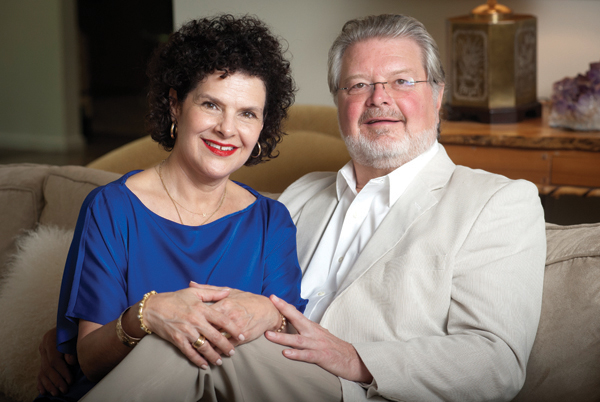
“We wished he were there, but his heart was too much in what he did. He was building our lives together.”
To make up for some lost time, the Parkers’ sons would often accompany him to “the office.”
“He wanted his children to be involved as much as possible,” Kerry said. “He would take them to the ER, they made rounds… and those were the times he could spend with them.”
But Parker had other reasons for wanting the boys with him at work.
“I wanted them to see what I did and I wanted them to also see that there were unfortunate people in the world and life was not always playing outside and having a great time,” he said. “There were kids their age who were ill. Both of my boys are very sensitive to that.”
Another reason Parker felt it was extremely important to bring his children to work was to demonstrate to them that everybody is equal across the board.
“For many years I would see outpatients in my own office downstairs,” he said. “It didn’t matter if they were Medicaid patients or the governor’s children, they all sat in the same seat and they were all treated exactly the same.”
And finally, going to work with Dad was something of a family tradition for Parker, who also went to work with his father until his untimely death when Parker was just 10 years old. A Harvard-trained eye, ear, nose and throat physician, his father returned to Meridian after World War II when the town needed a general practitioner more than an EENT.
Parker spent a lot of time in his father’s clinic and making house calls with him.
He credits him as his biggest influence. After his father’s death, a handful of his father’s friends stepped up to make sure Paul was raised with the proper male influence.
“They made sure he got to Boy Scout meetings, taught him how to hunt and fish and act around grown-ups. They took care of him,” Kerry said.
Once Parker made it to medical school, it was Batson himself who influenced him most. Parker had planned on going into internal medicine, but in his pediatric rotation at the end of his third year, he was so impressed with Batson – who also encouraged Parker to go into pediatrics – that he changed his mind.
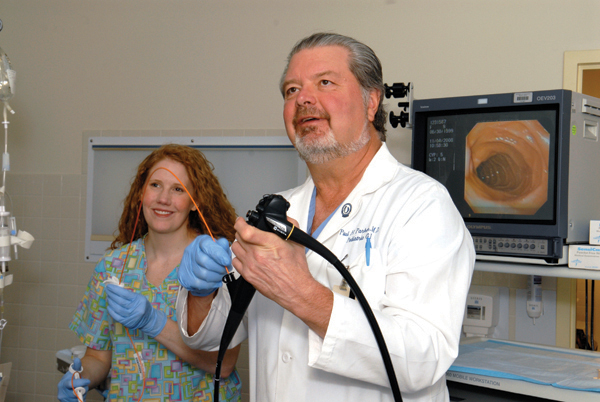
He went on to complete an internship, residency and chief residency in pediatrics at UMMC. It was during his residency that his interest in pediatric GI was born.
“As a resident, I probably had to read more about GI than anything else because we had no division here, and the more I read the more interested I became,” Parker said.
In returning to his native state, he filled a huge void in clinical services available to children. Before he began the division, GI problems were handled either by the adult GI service or by general pediatrics.
Parker ran the division alone for 17 years and his commitment to his patients was evident.
Long-time friend and Parker Chair Advisory Committee member Charles Porter said Parker was “always available and helpful to everyone.”
“He was very dedicated to his practice and I recall when he did not have anyone working with him, the number of hours he would work, including going in very early on Saturday to see patients and provide care.”
Until the advent of cell phones, he also had a practice of giving his home phone number to patients with serious illnesses because pagers weren’t that reliable.
“When I was by myself, I needed to know if a patient got sick,” Parker said. “It was much easier for me to deal with the problem with, say, a patient who has Crohn’s disease who is on steroids who has a 104 degree temperature at 3 o’clock in the morning. They don’t need to wait.”
And they rarely did.
Even on family vacations, he would work.
“When I woke up in the morning, I would call the hospital and make rounds over the telephone. Then I would call back later in the day to find out what messages from out-of-state physicians I needed to return and then I would call back in the evening to talk with the residents about what was going on with the patients in the hospital. I always felt like I was there,” he said.
Said Porter: “I have never seen a man or woman so good with sick children and so compassionate to anyone who needed his help.”
It should come as no surprise that Parker marks the arrival of his colleagues, Dr. Phyllis Bishop and Dr. Mike Nowicki, in 1998 as the most important time in his career.
This was not only due to the decrease in his call schedule, but as Parker said, “I gained two extremely bright, hard-working physicians who felt the same way I did, that the patient always comes first.”
A decade later in 2008, Kerry got a call about honoring Parker with an endowed chair in his name.
Not versed in fundraising, she formed a committee of five friends – Bryan Jones, Harry Walker, Richard Puckett, Holmes Adams and Porter. People she calls “pillars of the community” who knew a thing or two about how to raise money.
“The committee was so generous,” Kerry said. “They really stood up to the plate and batted it out of the park.”
The committee decided not to tell Parker until the first half of the $2 million endowment was in-hand. They met in secret at the then-Office of Development in the old nursing dormitory on UMMC’s campus.
“We always wondered, when we left, ‘what if we see him, what will happen?’” Kerry said.
The committee was off to a good start, until the economy tanked.
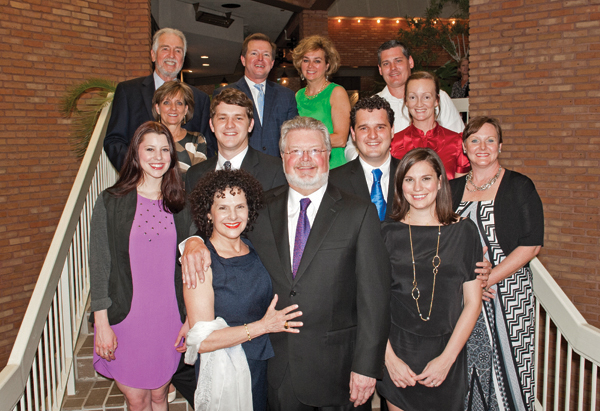
It would take another four years to gain momentum again. In June 2012, they had raised the first million dollars and it was time to let Parker in on the secret. Kerry and the committee planned the announcement party disguised as dinner with friends.
Around this same time, Parker had made an announcement of his own, deciding after 31 years on the UMMC faculty to finally hang up his stethoscope.
A little tongue-in-cheek, he cites electronic health records (EHR) and “keyboard dyslexia” as his reason for retiring.
“I loved practicing medicine, but I wouldn’t have been able to practice medicine the way I thought it ought to be practiced, he said. “Practicing pediatric gastroenterology and, I think, pediatrics in general, you’ve got to have a relationship with the family and the child. You’ve got to make the child, even if it’s an infant, relax. You can’t do that by not touching them, not picking them up, not playing with them.”
As EHRs made their way into UMMC, Parker made his way out.
His last day at the Medical Center was the last day of June 2012, just 30 days after the switch to EHRs and a few weeks after that announcement party – the one Parker initially believed was to celebrate his retirement and astounded him by revealing the academic chair bearing his name.
The occasion was emotional for everyone in the room, according to committee member Bryan Jones, Parker’s college roommate and long-time friend.
“He knows the importance of the chair and what it does and he was so very pleased that people had done that in honor of him,” Jones said. “He has loved and really cared about all of his patients all our lives. He’s been a very generous person. It’s a well-deserved honor for him.”
It’s an honor Parker “never dreamed” of receiving, but one that those who know him best dreamed into reality for him.


